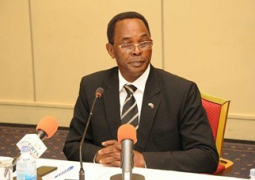The director general of The Gambia Tourism and Hospitality Institute (GTHI) Daouda Niang has made it clear that tourism development would require well trained staff to meet the service delivery needs of local and international tourists. Therefore, he stated, with support from Government through the Ministry of Tourism and Culture (GTHI) has over the last four years double its annual intake of 200 to 400 students, creating more employment opportunities for a growing tourism sector.
DG Niang made these remarks in a chat with the Information Officer at the Ministry of Tourism and Culture as the sector opens up its 2021/2022 winter season after along break caused by Covid-19.
Read below the full text of the interview:
- As we are approaching the end of 2021, it is no gainsaying that the Tourism and Culture sector under the leadership of Hon. Hamat N.K. Bah have matured remarkably in all spheres of development. DG Niang; can you please share with us your assessment of how far GTHI has come from since you took over this office?
The GTHI has indeed come a long way under the leadership of Hon. Hamat N.K Bah. Our monthly subvention from Government has significantly increased, allowing us to create more employment opportunities as well as retain our staff with better remuneration packages. For the first time in the history of the Institute, we have for the past four years been receiving a development support from Government to renovate our facilities and equipment to ensure quality teaching and learning for our students. In order to widen our scope of training and respond adequately to skills gaps in our sector, a fully equipped bakery and pastry centre with a capacity to train 100 bakers and pastry cooks every year was established in 2021. With the view to making the academic institute more conducive, a digital library with volumes of reading materials was established in 2021 through the development support from Government for students and instructors.
- In all the two periodic reviews of the NDP made so far, the Tourism and Culture sector has come out as the best performing sector as far as the goals of the NDP are concern, can you share with us GTHI’s contributions towards achieving this success?
Tourism is a key sector of the economy with a meaningful contribution to the country’s Gross Domestic Product (GDP). Being a service driven sector, tourism development would require well trained staff to meet the service delivery needs of local and international tourists. With support from Government through the Ministry of Tourism and Culture, The GTHI has over the last four years double its annual intake of 200 to 400 students, creating more employment opportunities for a growing tourism sector. The GTHI has contributed in spreading the tourism opportunities to the Regions since 2018 with the establishment of training annexes in Central River, North Bank and Lower River Regions where 180 youths were trained on hospitality skills. In 2021, The GTHI has started rolling out another training program on hospitality and bakery skills for 150 youths in West Coast and Upper River Regions.
- It was Gambia Hotel School and now Gambia Tourism and Hospitality Institute, what is the motive behind the change of name and what has changed since then?
The Gambia Tourism and Hospitality Institute (GTHI) was first established under the Ministry of Tourism and Culture as the Gambia Hotel School (GHS) with support from the German Agency for Technical Cooperation (GTZ) and the World Bank (WB) in 1981. The initial mandate was to offer training for new entrants to the hospitality industry in four disciplines: Front Office and Reception, Housekeeping and Laundry, Cookery and Pastry and Bar and Restaurant services.
In 2009 the Hotel School started a new transformation programme which was intended to raise its status and profile to the highest possible level of international standards. This development effort was facilitated through a great investment in Infrastructure (Buildings), Equipment and material with support from the Spanish Agency of Cooperation and Development and the World Bank under the strategic impulse of the Ministry of Tourism and Culture of the Gambia. The investment was completed in January 2012 but full operations started in January 2013.
With these resources, the Institute started a new and more competitive approach to the teaching of Hospitality and Tourism at International level to strengthen the position of The Gambia as a leading tourism destination and also create employment opportunities for the youths. The GTHI has now become the tourism and hospitality training centre of excellence in West Africa attracting students from Senegal, Guinea Bissau and Sierra Leone.
- How many students do GTHI have and how many graduates every year?
The GTHI is graduating 400 students annually and 95% of them secure employment upon completion.
- Your students are found in almost all the hotels and restaurants across the country, what is the secret behind this?
In August 2017, the GTHI engaged the services of an international consultant to revise the qualification framework and curriculum with the view to make it more coherent and streamlined, and to articulate with the University of the Gambia courses should graduates wish to pursue further academic studies. The revised curriculum framework is in Table 1 as attached below.
We believe the secret behind our results is a combination of Government investment on human capacity development with the facilitation of scholarships for Masters’ programs for four Senior Instructors and two Senior Managers over the past four years. Additionally, two Senior Managers and four other Junior Instructors are currently being supported to complete their BSc programs at the University of the Gambia. The GTHI management has equally been putting a lot of emphasis on quality assurance in the delivery of our programs for both the theory and practical teaching sessions.
- The Gambia, especially your sector had stood the challenges caused by Covid-19. As an institution responsible for training youth, can you tell us how you managed this crisis and how prepared are you for another potential crises?
The timely development of the GTHI Application for digital e-learning and the provision of personal laptops to all our Instructors played an important role in the interrupted delivery of our programs. This application has facilitated curriculum delivery during COVID -19 required school closure. As a result, the Institute did not lose time during this period.
- Can you please highlight some of the projects your institution has embarked on and how are they going to contribute to quality service delivery in the sector?
In 2018, the GTHI established a research unit with the task of developing international recipes using local ingredients, creating better linkages with agriculture. At the same time GTHI in conjunction with the Gambia Hotel Association conducts research on current food and beverage recipes with the view to promoting the use of local ingredients that would result to better food quality and better linkages with the local economy. This led to the development of several recipes with local ingredients.
- As a training institution, if you are going to rate your institution in terms of providing quality education to Gambians, what would be your rating and why?
The GTHI can be rated 7/10 simply becausedelivering total quality education in tourism and hospitality is capital intensive and lot more resources are needed to provide teaching and learning equipment on professional cookery and housekeeping as well as an application hotel where our students can practical training sessions in the most professional manner.
- Can you share with us your plans and projects to undertake in the coming year?
In 2022, The GTHI in partnership with GIZ will be putting up the first ever agri-food processing centre with modern workshops, laboratories, sanitisation rooms and stores. In the same vain a curriculum and content manuals would be developed to train 100 Gambians annually.
- You have recently visited Kenya for a study tour on tourism related matters, what are the best practices and lessons learned during the tour?
The lessons learnt from Kenya are as follows:
- A close collaboration and involvement of the private sector in training delivery is key to quality service delivery in the sector;
- A hotel training school be private or public cannot be complete without adequate training equipment particularly in professional cookery and an application training hotel, and
- 40% of the tourism levy collected is spent on training for both private and public hospitality training institutes according to Honourable Najib Balala, the Kenyan Tourism Minister.
- If you are going to appeal for a support from your central government, what would you ask for?
- Three well equipped training kitchen with capacity of 30 students each to train more youths in Gambia and beyond;
- New laundry and housekeeping equipment, and
- A 5-star application of hotel of 50 rooms.
- If you are to advice your staff and students, what would you advise them?
We would enjoin the GTHI staff to continue the good work they have been doing and treat the students as our customers who deserve good value for money for the knowledge they have come to seek in the institute.
And for the students, we remind them that an investment in knowledge pays the best interest. Therefore, discipline, discipline is required all the way.



